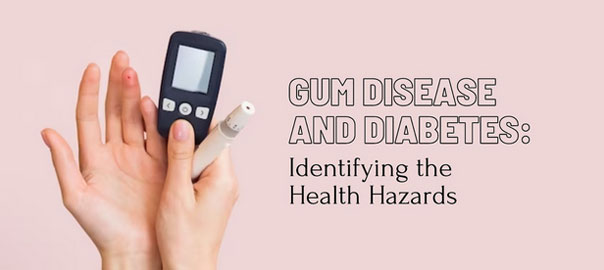
What Are the Risks of Gum Disease for People with Diabetes?
Diabetes is just one of the chronic medical conditions affecting millions of people across the world. If diabetes is not well-controlled, then the root cause of most complications that develop is high blood glucose. Many risks are ascribed to diabetes but yet another, much subtler and insidious, complication of diabetes relates to gum disease or periodontal disease. Periodontal disease is an infectious process originating in the gums and the supporting structures of the teeth. This post will discuss the complicated relationship between diabetes and gum disease, including risks and stress imposed on oral health for those diagnosed with diabetes.
Diabetes and Oral Health
There are two ways in which diabetes can impact oral health. First, much sugar in the blood is a big survival for bacteria; thus, there are very great risks of infection in the mouths. The disease diabetes affects the capability of the human body to fight infection and gum diseases that make it more vulnerable to gum diseases’ severities linked to patients suffering from the disease.
Gum Disease
It has been observed from the research studies that the patients suffering from diabetes are highly vulnerable to gum diseases. Actually, there is a three-fold tendency toward gum diseases in the patients of diabetes. The reasons are many.
The most significant reason is poor control of blood sugar. Uncontrolled diabetes permits uncontrolled high blood sugar in the blood. They act as a breeding ground for the microbes in the mouth and when the body’s immune system is destroyed. On top of all these, diabetes causes dry mouth, and whose conditions are the time when the mouth lacks sufficient saliva. All these functions recently make a very significant role for saliva: removal and neutralization of bacteria in that sense to avoid the presence of dental diseases while acids that food particles produce, the mouth is even more vulnerable to gum diseases and other oral diseases
Inter-Relationship
Gum disease is not just an oral health issue; the bacteria of gum disease can be transferred into the blood where they may cause systemic inflammation that accompanies the decrease in complications of diabetes. Some other complications identified in patients with diabetes and who are thought to be associated with gum disease include an increased tendency towards diseases of the cardiovascular system and of the kidneys and also poor glucose metabolism.
Preventive and management interventions
A diabetic patient should have oral hygiene maintained and proper oral hygiene prevents any individual from getting gum diseases. Thus, the patient must brush their teeth twice daily with a soft-bristle toothbrush, floss each day, and has to undergo scheduled check-ups and cleanings at the dentist’s place. Proper management of blood sugar can decrease the chance for developing gum diseases through proper diabetes management: drugs, healthy diet, and regular exercise.
Since the risk of diabetics suffering from gum disease is very high, there is comprehensive oral care in the management of diabetes. Once the two-way relationship between diabetes and gum disease is understood, it puts the person in an excellent position to safeguard himself or herself from devastating oral health complications. Regular dental check-up and proper oral hygiene, along with diabetic control, minimize risks and complications pertaining to gum diseases through this mechanism. Better quality life and excellent general health can be given to diabetic patients.
Please note that the prices mentioned in this blog: (a) present a range (depending upon the severity of the dental condition, the technology used in treatment, type of dental products used, etc.); (b) are true as on the date of this blog and may change on a later date, in accordance with the standard company policy; (c) may be subject to standard aberrations or generalizations on account of the use of AI in general Google/internet search by you.





